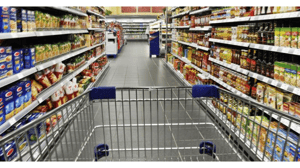Consumer Sentiment Slides on Inflation, Omicron Concerns
Inflation is a bigger headache for the economy than unemployment, consumers say. Forty percent of consumers with household income in the bottom third of all consumers said they're worse off financially than they were at the start of 2021.

Consumer sentiment skidded in early January to its second-lowest level in a decade, according to the University of Michigan's latest consumers survey.
In preliminary January results, released Jan. 14, consumer sentiment fell 2.5% from December levels to 68.8 on a 100-point scale. The low-water mark for the past 10 years, 67.4, was set in November.
Moreover, consumer sentiment so far in January is down nearly 13% from year-ago levels. Consumers' assessment of current economic conditions (73.2) sits significantly above their near-term expectations for the economy (65.9), although their view of the present landscape has fallen more sharply over the past year than their economic outlook has.
What's dragging down sentiment? Concerns about surging COVID-19 cases and the labor and economic pressures tied to the ongoing pandemic are a factor, but accelerating inflation appears to be having a bigger impact, according to Curtin. Three-quarters of consumers in early January said inflation was a bigger problem facing the country than unemployment, the survey found. Going forward, "The most crucial and difficult task will be defusing the developing wage-price spiral," Curtin wrote.
Notably, some 40% of consumers with household incomes in the bottom third of all consumers said they're worse off financially than they were a year ago. Overall, 33% of consumers reported being in worse financial shape than at the start of 2021—that's higher than the 32% who said the same in April 2020 and the worst reading since 2021, noted Richard Curtin, the Survey of Consumers chief economist.
Those in higher-income households were more bullish in their survey of the economic scene: "The Sentiment Index fell by 9.4% among households with total incomes below $100,000 in early January," Curtin wrote, "but rose by 5.7% among households with incomes over that amount." Economic expectations were lower among lower-income households, too.
See also: Meat Volumes Feel the Heat of Inflation
Still, even more-optimistic consumers surveyed this month were more likely to expect bad economic conditions than good in the year ahead, he added, with confidence in government economic policies at its lowest level since 2014.
In a paper earlier this week, Curtin noted that consumers' economic expectations are now shaped far more by their political affiliation than they used to be, with the gaps between Democrats and Republicans in their economic outlook doubling from the Bush and Obama administrations to the Trump and Biden administrations. Further, "Partisanship now dominates the more traditional income and age relationships," Curtin wrote.
About the Author
You May Also Like






